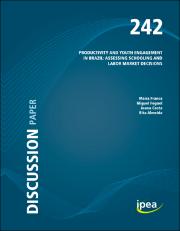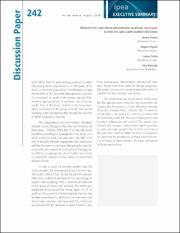Please use this identifier to cite or link to this item:
https://repositorio.ipea.gov.br/handle/11058/9304Files in This Item:
| File | Description | Size | Format | |
|---|---|---|---|---|
| DP_242.pdf | 2.01 MB | Adobe PDF |  View/Open | |
| DP_242_sumex.pdf | 46.71 kB | Adobe PDF |  View/Open |
| Title: | Productivity and youth engagement in Brazil : assessing schooling and labor market decisions |
| Other Titles: | Discussion Paper 242 : Productivity and youth engagement in Brazil : assessing schooling and labor market decisions Produtividade e engajamento de jovens no Brasil : avaliação da escola e decisões de mercado de trabalho |
| Authors: | Franca, Maíra Albuquerque Penna Foguel, Miguel Nathan Costa, Joana Simões de Melo Almeida, Rita K. |
| Abstract: | One of the main concerns with youths is the nem-nems, which correspond to the group of youths that are not investing in their productive skills through the activities of either studying or working. This study analyzes data from National Household Sample Survey (Pesquisa Nacional por Amostra de Domicílios – PNAD), 1995-2015, to describe youth condition according to 4 categories: only study, only work, study and work, and nem-nem. An age-period-cohort model is considered to capture the influence of these factors on work/study decision trends. The year effects indicated that the decision to only work is pro-cyclical (i.e., tend to co-move with the economy), while that of being nem-nem or only studying are anti-cyclical. The results also showed that younger cohorts have higher proclivity to study and lower propensities to work and to be in the nem-nem condition. |
| metadata.dc.rights.holder: | Instituto de Pesquisa Econômica Aplicada (Ipea) |
| metadata.dc.rights.license: | Reproduction of this text and the data it contains is allowed as long as the source is cited. Reproductions for commercial purposes are prohibited. |
| metadata.dc.type: | Discussion Paper |
| Appears in Collections: | Educação: Livros Emprego. Trabalho: Livros |
Items in DSpace are protected by copyright, with all rights reserved, unless otherwise indicated.

